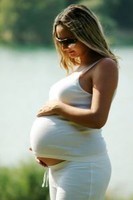
The team, led by Professor Graham Devereux of the University of Aberdeen, is now recruiting pregnant women to the study. The women will receive a soup specially boosted with natural vitamin E containing food ingredients, as part of the experiment.
“The ultimate aim of this research is to reduce the prevalence of asthma by an effective, inexpensive, acceptable and safe public health dietary intervention,” said Devereaux. “If successful the proposed intervention could form the basis of public health dietary advice to pregnant women that could reduce the prevalence of childhood asthma by 15-20% within five years.”
First of its kind
The first of its kind study will use dietary rather than vitamin tablet supplementation to see if enhanced vitamin E levels can help prevent childhood asthma, said the researchers.
“Although far more difficult, it seems more natural to give vitamin E in a natural food form rather than a vitamin E pill because the vitamin E containing foods comprise a complex mix of nutrients that might be critically important, when one considers the foods containing vitamin E, soup seems an obvious intervention,” said Devereaux.
Industry collaboration
The University of Aberdeen research group collaborated with Scottish food manufacturing firm Baxters Food Group to produce three soups that will be used in the trial. The three soups have had their ingredients carefully selected to enhance levels of vitamin E in pregnant women from the current national average of 8 mg per day to the optimal recommended daily allowance of 15 mg per day.
The enhanced soups are made from a range of vitamin E-containing food ingredients, including sundried tomatoes, sunflower oil, beans, lentils and wheatgerm.
A range of similar looking and tasting low vitamin E ‘placebo’ soups have also been designed and produced by Baxters.
Pilot study
As part of the new study, 50 pregnant volunteers will eat three servings of soup a week, starting 12 weeks into pregnancy and continuing right through to the delivery of their baby.
The newborn infants will then have their lung function measured during the first week.
If the outcomes are promising, and the fortified soup’s are well liked and tolerated by the participants, Devereux says the group will then look to expand their research and will seek funding for a much larger study.
“We are launching an initial pilot study is to see if pregnant women will take part in such a trial and are happy with the soup intervention. Depending on the outcome we will then launch a much bigger study which we hope will show that vitamin E does indeed reduce the risk of children developing asthma,” he explained.







